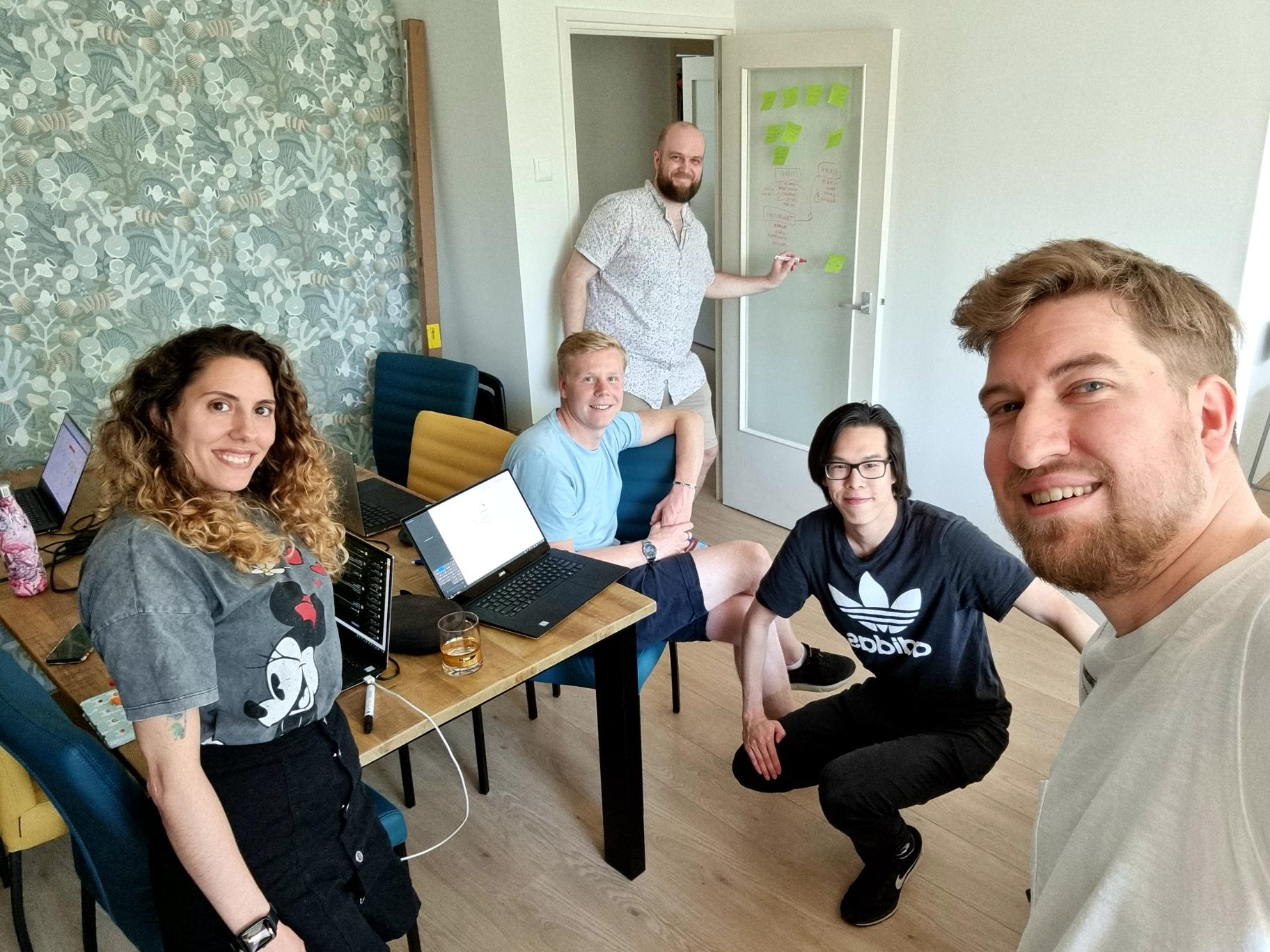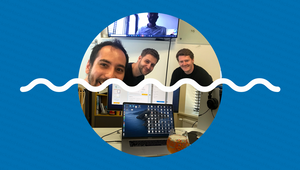Funda's latest Hackathon has just taken place. In this edition, too, thirteen teams pitched excellent ideas, some of which were put into practice straight away. We took the opportunity to chat to participating funda engineers Rudy van Sloten, Lars Schuitema and Jelle van Noord about the ins and outs of their ideas and about the hackathon itself.
WHICH IDEA DID YOU WORK ON DURING THE HACKATHON?
Jelle van Noord (back-end developer): ‘Our team made a game for funda staff, in which you can play against each other, like a EURO 2020 group. At funda we of course all work with property, and we thought it would be good to transform that into a game to test how good our colleagues are at investing. The ‘Landlords’ game is all about our own data, the properties. The aim is that you buy houses for the asking price and can then increase your fictional bank balance if the house is sold above the asking price. The competitive element is really nice: who is the best investor, and who has less of an eye for it?’
Rudy van Sloten (DevOps engineer): ‘Our idea was based on a practical case: under the bonnet, the funda website is composed of a load of smaller applications. At the moment we rent or lease servers or services from providers such as Microsoft. We pay a fixed fee for these every month, regardless of how busy the website is. With smaller applications that individually have little traffic, this is a waste, as it means that you're paying a lot of money for something that doesn't do very much, and perhaps is doing nothing at all for most of the day. That's why we proposed to make certain elements ‘serverless’. When they talk about 'serverless', hosting providers mean that they no longer rent you a physical server, but you only pay for the time that the application is actually being used. As a team or developer, you can upload an application code to the provider, and for each transaction you only pay a fraction of a cent. In practise this means that you pay a large sum for a million transactions, but almost nothing during quiet periods. If you don't get any visitors during the night, you barely pay a thing. During the hackathon, we switched an application from the traditional model to this new model in a very short amount of time.’
Lars Schuitema (front-end engineer): ‘We worked on an idea to buy and sell properties via blockchain, using a smart contract. This allows you to easily transfer ownership, without the involvement of third parties. We knew from beforehand that our idea was not particularly realistic, but we actually got it working. The hackathon gave us the time to think about the future and to be experimental. It's not just about building something that can be put into use straight away; you can also work on something innovative. And of course it's great to see how far you can get!’
See also: 6 highlights during my first four weeks at funda: Product Owner Ugo
DID YOU WIN AN AWARD?
Jelle: ‘No, but that wasn't our ambition. Of course, there wasn't really a business case behind the game, and it actually got quite big, so it couldn't be quickly put into production. The main significance and added value of a hackathon is that we get the chance to test new technologies – things that you often don't have time for in your everyday work. For example, I usually don't work much with SOLR, but this is where we got our data from, so I had time to learn more about it and explore it.’
Rudy: ‘We didn't win an award either. Most of the winners this year were visually very attractive. For example, a big winner was an idea that allows you to search interactively on funda's map. This was also easy to grasp for colleagues who do not have a technical background – which is not the case if you're talking about blockchain or working serverless. So while there may be a good idea on the table, without a technical background it's difficult for you to visualise it, meaning you end up voting for a project that can implemented immediately, such as an app you can use to book some time in the office (based on workstation availability, in order to comply with the coronavirus regulations, ed.). Just like the interactive map, this was a visual project that had an immediate wow factor. Everyone could also log on and try it straight away.’
Lars: ‘What's nice about the interactive map is that the team used the work from our regular team at funda as the basis for their hackathon idea. Earlier this year, we rebuilt funda's search functionality. In the hackathon, they used this as their foundation to allow users to draw on the map. With their feature you can search for properties in the area you have drawn, which is an extension of our work. So for our team there was no award, but it was funny to see a team winning that had built upon the basic structure I work on every day.’

AT THE END OF THE HACKATHON YOU COULD VOTE FOR AN IDEA. WHICH ONE WAS YOUR FAVOURITE?
Jelle: ‘For consumers, being able to draw on the map is really practical and looks great. So that's what I voted for. I think the office app is also really useful. It was made by a engineer in only 24 hours, together with an office manager and designer, and we all started using it just a week later.’
Rudy: ‘I also voted for the map. That was the most attractive idea. The office planner went live during the presentation, which is pretty cool. There were lots of other good ideas, for sure, but they weren't necessarily immediately feasible or were only suitable for the long term, so they had less impact. Other websites have already experimented with a map-drawing function, but this team did it better. I'm looking for a house myself, and I've realised that I sometimes want to do a really specific search in a neighbourhood, but it's not possible. This option to draw on the map completely meets this need.’
Lars: ‘I feel the same as Rudy. And the function to allow drawing on the map can also go straight into production. The only drawback for me is that I now need to implement it as part of my daily work! It's been added to our backlog.’
WHAT WAS TYPICALLY FUNDA ABOUT THIS HACKATHON?
Jelle: ‘The hackathon team recreated the normal office atmosphere online. Instead of getting takeaway pizzas in the office, we were able to order food for home delivery and also got sent a box of tasty beers. They also made a virtual copy of the office for the online platform, so we could eat together with colleagues in this digital setting. This gave us, to some extent at least, the feeling of being together.’
HOW MUCH COFFEE DID YOU DRINK, AND HOW MANY HOURS' SLEEP DID YOU LOSE?
Rudy: ‘Quite a lot, on both counts! Our team worked until something like 1am or 2am. If you're in the middle of something, it's not so easy just to stop. We wanted to finish at midnight, but then we kept saying like, ‘no, not quite yet’, or ‘this isn't working yet’, and then you keep working for another 15 minutes.’
Lars: ‘Usually, when the hackathon is held in the office, I keep working until late at night, but the experience was a bit different online. I also had to work the next day and was really busy with the sprints...’

WHAT'S GOOD ABOUT WORKING AT FUNDA?
Lars: ‘I come from a start-up background, and what I notice at funda is that despite its size, with around 150 employees, the atmosphere remains personal. And that is the case at every level. Each year, we have a conversation with the CEO, which is unique. In corona times they have really done their best to keep staff motivated, such as by having a chat about how everything's going, and switching all the parties that we normally have in the office to a digital environment. Not every company has worked so hard on this, but at funda they've really pulled out all the stops.’
See also: What they don't teach you at software university: 5 insights
IS THE HACKATHON SOMETHING TO LOOK FORWARD TO?
Jelle: ‘Definitely, the hackathon is really something different to your daily work. I'm always up for it. For 24 hours, you work with people from various disciplines, who you normally don't have much contact with. By working with colleagues from marketing or sales you learn to look at things from their perspective, which makes it extra informative. Normally I work in the estate agents' team, and the marketing team are in constant contact with the estate agents. They taught me how estate agents really look at things and what they find important. I will bring what I've learned into my own work.’
Rudy: ‘As I do part-time consultancy work at funda, I work a lot with various teams. It's not the same for other members of the team, who have fewer chances to hear directly from colleagues about issues regarding what we design and build. During a hackathon you hear things that you don't normally think about, because you often just consider things from your own point of view. For example, a designer may tell you: ‘I want to make a new design go live, but that's not easy with the method you've come up with’. In our day-to-day work, the communication is usually not so open, which means that services or products may not always be used as intended. Working together can open up channels between different disciplines. In a hackathon, you're encouraged to put yourself in each other's shoes.’
WILL SOMETHING HAPPEN WITH YOUR IDEA?
Jelle: ‘No, I don't think so. Our game was accessible to colleagues during the demonstration, and they used it straight away. But I don't think anything else will be done with it.’
Rudy: ‘After the hackathon we had a meeting to discuss what could be done to get it into production. Funda wants to make our idea, in an adapted form, go live. We generated more interest internally than the original idea did, because what we developed performed so well, and it can be applied much more widely. Though our idea didn't pick up an award, it's of course really nice to know that, in the end, it will be used by our customers.’

